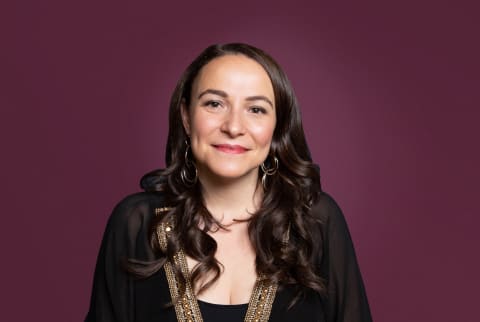Advertisement
This Is Your Brain On Prayer: A Psychiatrist On How Spirituality Changes Your Neurochemistry


Here at mbg, we believe everything is connected (hence, one word: mindbodygreen), so the idea that spirituality can function alongside psychiatry is one that makes total sense to us. But according to board-certified psychiatrist Anna Yusim, M.D., lecturer at Yale Medical School (where she's creating a Mental Health and Spirituality Program), the connection between spirituality and mental health actually has an evidence-backed link.
In fact, she tells us that spirituality can change the neurochemistry in your brain: "There's a whole science to prayer. It's very powerful," she says on this episode of the mindbodygreen podcast.
Here, Yusim explains how your brain responds to spirituality, as well as how to tap into a greater force to enhance your mental health.
The connection between neurobiology and spirituality.
"Whatever relationship you have with God, it's something that can also be broken down into a very biological neurologic process," Yusim notes. Specifically, a connection to spirituality lights up certain parts of the brain: According to a study found in the journal Social Neuroscience, religious and spiritual experiences can activate your brain reward circuits in the same way as love, sex, gambling, drugs, and music.1 There's even a whole field dedicated to researching the connection between your brain and religion, dubbed "neurotheology2."
In terms of mental health, plenty of older studies have covered how spirituality can boost serotonin levels3 (aka, the feel-good neurotransmitter that stabilizes mood). And another more recent study found that stroke survivors who identified as spiritual reported higher psychological quality of life. The thought is that having a personal sense of meaning improves motivation and that religion and spirituality can be a source of comfort for people dealing with chronic illness and stress. Nonetheless, spirituality is largely associated with positive mental health.
Some research points to spirituality's effects on physical health, too: "Science shows that when individuals have some sort of spirituality, whether it be a spiritual practice, spiritual belief, or health-promoting spiritual ritual or behavior, all that helps in healing4," Yusim notes.
The bottom line? Spirituality is powerful, and it may have a variety of health benefits.
How to tap into your spirituality.
First things first: Before cultivating a sense of spirituality, you must define what spirituality means to you. It's a different path for everyone—according to Yusim, "The way that I define it is a connection to something greater than oneself."
For some, it's God or religion; for others, it could be nature. Yusim even states that "a sense of interconnectedness, your collective unconscious, or even a set of transcendent values that help to elevate hope, trust, and perseverance" all fall under the umbrella of spirituality. "All of those are different ways of having a spiritual connection, but all equally powerful."
The next step, she notes, is to surrender to that higher power—whatever it may be. "At the end of the day, it's having to sit with difficult emotions," she explains. Yusim finds meditation helpful—it allows her to connect with that greater force—as well as a journaling practice: She sits with her emotions for 20 minutes, twice a day, and writes about her experience afterward. "Expression is also, for me, a powerful way of letting go."
You don't have to follow that same regimen (whatever works for you works!), but the kicker here is teaching yourself to be OK with uncertainty—embrace it, even. "Life isn't always joyful and peaceful. Life is also crazy and full of uncertainty, fear, anxiety, and doubt," Yusim says. "It's in looking within and finding that source of strength that we often didn't know existed and tapping into that stillness—that's what helps people get through."
The takeaway.
Let it be known: There's science behind spirituality, and according to Yusim, it may even change your brain circuits. Although, there are tons of avenues to explore when it comes to spirituality. It isn't rigid or set in stone—and this is a good thing! There are so many ways to tap into a higher power, which means there are tons of ways to reap the potential health benefits. According to Yusim, as long as you surrender to uncertainty and trust the greater force at hand, you should be set.
Enjoy this episode sponsored by CVS! Whether it's an article or podcast, we want to know what we can do to help here at mindbodygreen. Let us know at podcast@mindbodygreen.com.